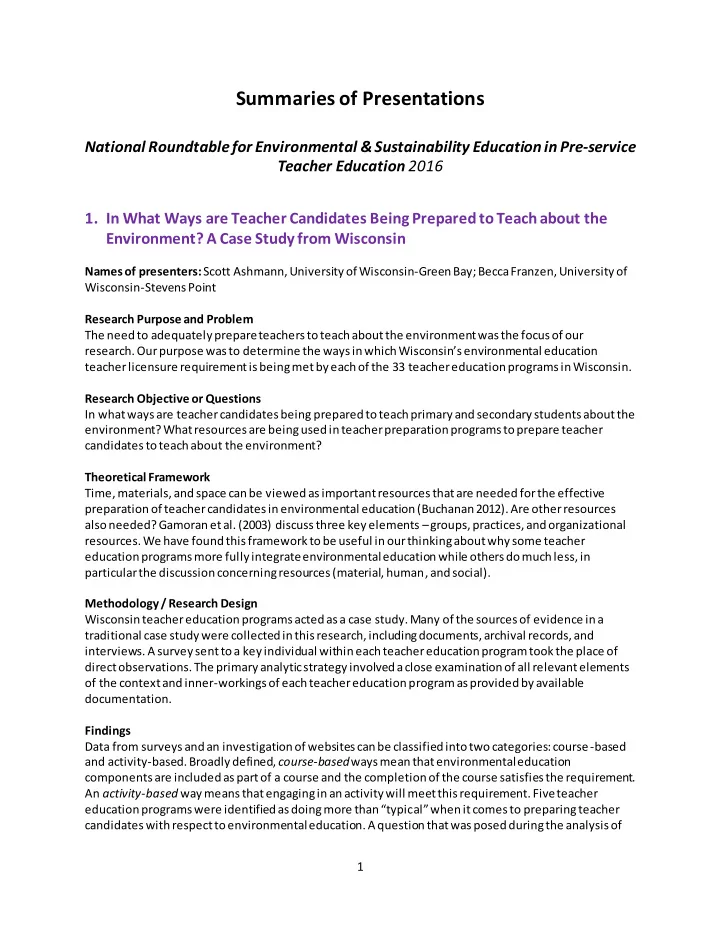

Summaries of Presentations National Roundtable for Environmental & Sustainability Education in Pre-service Teacher Education 2016 1. In What Ways are Teacher Candidates Being Prepared to Teach about the Environment? A Case Study from Wisconsin Names of presenters: Scott Ashmann, University of Wisconsin-Green Bay; Becca Franzen, University of Wisconsin-Stevens Point Research Purpose and Problem The need to adequately prepare teachers to teach about the environment was the focus of our research. Our purpose was to determine the ways in which Wisconsin’s environmental education teacher licensure requirement is being met by each of the 33 teacher education programs in Wisconsin. Research Objective or Questions In what ways are teacher candidates being prepared to teach primary and secondary students about the environment? What resources are being used in teacher preparation programs to prepare teacher candidates to teach about the environment? Theoretical Framework Time, materials, and space can be viewed as important resources that are needed for the effective preparation of teacher candidates in environmental education (Buchanan 2012). Are other resources also needed? Gamoran et al. (2003) discuss three key elements – groups, practices, and organizational resources. We have found this framework to be useful in our thinking about why some teacher education programs more fully integrate environmental education while others do much less, in particular the discussion concerning resources (material, human, and social). Methodology / Research Design Wisconsin teacher education programs acted as a case study. Many of the sources of evidence in a traditional case study were collected in this research, including documents, archival records, and interviews. A survey sent to a key individual within each teacher education program took the place of direct observations. The primary analytic strategy involved a close examination of all relevant elements of the context and inner-workings of each teacher education program as provided by available documentation. Findings Data from surveys and an investigation of websites can be classified into two categories: course-based and activity-based. Broadly defined, course-based ways mean that environmental education components are included as part of a course and the completion of the course satisfies the requirement. An activity-based way means that engaging in an activity will meet this requirement. Five teacher education programs were identified as doing more than “typical” when it comes to preparing teacher candidates with respect to environmental education. A question that was posed during the analysis of 1
all data gathered in this study was, “Do these five programs that ‘stand out’ from the others in the state have anyt hing in common?” A close examination shows that each has a driving force at the institutional or department level that facilitates the development of high quality environmental education activities by individual staff or faculty. Significance The primary takeaway for us from this study was that every teacher education program, even those that are doing more than “typical,” could be doing more with respect to including environmental education in teacher preparation and that the likely candidate(s) for why more is not being accomplished is the absence of a resource – material and/or human and/or social. 2. Sustainability and Teacher Education: Notes from Manitoba and beyond Name of presenter: Chris Beeman, Ph.D., Brandon University Co-authors: Laura Sims, Ph.D., Université de St. Boniface; Lee Anne Block, Ph.D., University of Winnipeg; Thomas Falkenberg, Ph.D., University of Manitoba Teachers play a significant role in educating youth to value a sustainable way of living that respects the human and more-than-human environments of which they are a part. Teacher education can be instrumental in developing values and practices necessary for teacher candidates to develop a pedagogical approach that supports a transition towards sustainability (UNECE, 2012). As these values and practices emerge for beginning teachers, teachers may in turn transform the learning experiences of their students. In faculties of education, this complex process requires a pedagogy that engages with diverse perspectives and is oriented to inquiry, problem-solving, and a systems approach. This paper examines such pedagogies in three Manitoba faculties of education: University of Winnipeg, Université de St.-Boniface, and Brandon University. Our purpose was to find points of correlation and difference between our practices and our contexts. The theory-practice dialectic is explored, as well as factors that constrain and facilitate reorienting teacher education towards sustainability in a Manitoba context. Phenomenological hermeutics was a major research methodology, as was autoethnography. The focus is on the situated practice of three professors at these three different institutions, who intentionally focus on and integrate education for sustainability within their teacher-education courses and professional practice. Through our collaboration on this paper, linkages between our practices arose, despite our differing theoretical perspectives. As these linkages emerged, our understanding of our positions and practices has deepened and become more nuanced. In the process of writing and talking, we noted that several themes common to all authors emerged. The first theme is the structural nature of the constraints on our teaching practice. That is to say, that which divides or restricts us from what we would like to do often occurs at a cultural and institutional level. Faculties of education, like other institutions, have dominant perspectives. Education for sustainability tends to be viewed as either radical, novel and unproven, or a discipline whose time has long ago passed. Often, education for sustainability is viewed as being a specialized discipline without broad relevance to educational practice. These perspectives cannot envision a relationship with the more-than-human world other than the relationship modern Western culture currently enacts. The second theme that emerges in our work is an awareness of other structures which tend to permit, authorize or legitimate our practice. In all contexts, and despite marginalizing influences, some policies, rules, or governing direction has allowed us to teach and research in this area. In each author’s individual section, we have explored these facilitating and 2
Recommend
More recommend